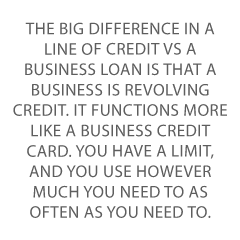Is it Better to have One Loan or Line of Credit?
If the financing is in the name of your business, it doesn’t really matter how many loans or credit lines you have.
What matters is that you handle them responsibly and pay on time or even early.
If they report to the business credit reporting agencies, that is even better. But, try to have a good mix of account types that report.
If you already have more than one loan and more than one line of credit, consider throwing some business credit cards in the mix before getting another of either.
Not only can it help with managing cash flow, but having a variety of different types of accounts reporting can boost your business credit score.
What are the Requirements for a Business Line of Credit?
An unsecured business line of credit is typically going to require both a good personal and business credit score.
A traditional lender often requires at least a 650 or 700 personal score. Some online lenders will approve a business owner with a score lower than this.
Additionally, a lender may require a certain amount of time in business and a minimum annual revenue, among other things.
A secured line of credit, like a merchant cash advance or invoice financing, may not require anything more than merchant statements or lists of open invoices.
Does a Business Line of Credit Affect Your Credit Score?
It depends. If the lender reports to the business credit reporting agencies, then yes it will affect your business credit score.
There are few lenders that report positive payment history to business credit reports. However, many more report missed payments only, if they report at all.
If you want to build your business credit, be sure to find a lender that will report positive payment history.
When you start trying to get funding for your business, there are a number of decisions you have to make.
One of the first choices is between a business line of credit vs a loan. Honestly, it can be a difficult choice to make.
They each have their benefits, and the decision as to which one will work best is highly individual.
A lot of factors come into play, including exactly how you plan to use the funding. It helps to fully understand what each type of funding actually is.
What Is a Business Loan?
A business loan, also known as a commercial loan, is the type of funding business owners most commonly recognize.
Per Investopedia, “A commercial loan is a debt-based funding arrangement between a business and a financial institution such as a bank.”
There are many different types of business loans. However, in general, these are traditional term loans that require monthly payments. They function like a mortgage or car payment does for an individual.
These payments include both principal and interest, and are made for the term agreed upon at loan approval. Interest may be fixed or variable. It just depends on the terms of the loan.
Funds are received in one lump sum payment, and the borrower repays the requisite payment on the full amount each month.
If payments are made regularly, the balance will be paid off by the end of the agreed upon term. This could be 5, 10, 15, 20, or even 30 years or more, depending.
Funds may be used for a number of things, from purchasing new equipment to working capital. There are loans that limit what the funds can be used for, specifically some loans that have a guarantee from The Small Business Administration.
What Is a Business Line of Credit?
A business line of credit is similar to a business loan in that it is a debt based funding arrangement.
It is also generally made between a business and a financial institution, although just like a loan, the type of financial institution can vary.
The big difference in a line of credit vs a business loan is that a business is revolving credit. It functions more like a business credit card. You have a limit, and you use however much you need to as often as you need to.
You only make payments on what you use. So, if you have a $10,000 credit line, the entire $10,000 is available to you. But, if you only use $1,000 during a month, you will only make payments on that $1,000, unless or until you make another draw.
After you draw the $1,000, only $9,000 is available to you. However, the amount of principal you pay back each month is added back to the available balance.
There are a number of reasons this is better than using credit cards. The main reason being that a business line of credit is almost always going to have a lower interest rate than a credit card.
That said, there are usually not the same options for rewards, nor the same online protections for purchases that some credit cards offer.
Differences Between the Two
While the revolving credit vs. term loan is the main difference, there are others.
Difference 1: Interest Rates
Generally speaking, interest rates on business lines of credit are higher than what you would get on a term loan.
As a result, it may seem like a no brainer decision. However, due to the term vs. revolving nature, it really isn’t so cut and dry.
For example, you may be able to access a business line of credit at an interest rate of 9% and a term loan with an interest rate of 5%.
Again, it seems like a simple decision. If you need to purchase equipment or make another one time purchase, it is simple.
But, that leads to the next difference.
Difference 2: Cash Flow Management Options
If you need to make a one time purchase, a term loan is likely best. However, if you need the option to access funds as needed, then a business line is likely better.
Despite a higher interest rate, you may still save, as you are only making payments on the amount you are using.
Imagine this scenario. You need access to a cash pool for various circumstances that may arise during the year.
So, you have two options. You can take out a term loan and put the funds in an account to draw on as needed, or you can get a business line of credit.
If you consider the same interest rates noted above and an amount of $10,000, then on day one you are making payments of just over $100 each month.
At the end of the 10 years, you will have paid over $2,700 in interest, regardless of whether you ever use a dime of the loan funds.
Yet, if you take a credit line, it’s all different. There are no payments unless you use the funds. Then, you only make payments on the amount you use.
If you use $2,000, you will only make payments on the $2,000.
Assuming the 9% interest and the same 10 year term, that is just over $25 per month and just over $1,000 interest total.
Of course this is a simplified example. Obviously you will likely make additional draws on a business line over time.
But you can see how you would be able to save money over the long term and better manage cash flow, even if the overall interest rate is higher.
Difference 3:- Access
Traditional banks are the most common option for term loans. That can make them hard for small businesses to access.
There is the option of an SBA loan. This is a small business loan backed by The Small Business Administration.
Due to the SBA guarantee, more businesses may be eligible. However, there is a lot of red tape and other requirements.
There are many more alternative lenders that offer a small business line of credit. They come in many forms as well.
You can get an unsecured line of credit from these online lenders. But many offer other types of credit lines also, and they may be easier for small business owners to get.
Invoice financing and merchant cash advances are popular options. These work like a credit line, but are secured by open invoices or expected credit card payments.
Since these lines are secured, interest rates tend to be lower and your credit score, business or personal, doesn’t weigh as heavily into the approval decision.
In some cases with these types of secured credit lines, the credit provider will not even check credit scores.
As a result, credit lines are typically accessible to more small business owners.
Which One Should You Get?
This decision is a highly individual one based on a number of factors. The first consideration should probably be which one you actually qualify for.
If you have both strong personal and business credit, you will likely qualify for both.
If you are lacking in either of these areas, you may have a better chance at a business credit line with a non-traditional lender.
Then, consider how you plan to use the funds. If you are looking at a one time expense, or a few large expenditures over a short period of time, a business loan will be best.
Most likely it will offer the lowest interest and a higher loan amount.
In contrast, if you need a revolving line for ongoing use, similar to a credit card, consider a line of credit.
Another consideration is whether or not you qualify for an SBA loan. If so, you may want to weigh it against your other options. While there tends to be a lot of red tape, and the approval process can take much longer, there are a number of benefits as well.
The main one being a reduction in interest rates and better terms. Though revolving credit isn’t usually an option, they have loan programs for a number of circumstances and uses, including working capital.
FAQs
Is it Better to have One Loan or Line of Credit?
If the financing is in the name of your business, it doesn’t really matter how many loans or credit lines you have.
What matters is that you handle them responsibly and pay on time or even early.
If they report to the business credit reporting agencies, that is even better. But, try to have a good mix of account types that report.
If you already have more than one loan and more than one line of credit, consider throwing some business credit cards in the mix before getting another of either.
Not only can it help with managing cash flow, but having a variety of different types of accounts reporting can boost your business credit score.
What are the Requirements for a Business Line of Credit?
An unsecured business line of credit is typically going to require both a good personal and business credit score.
A traditional lender often requires at least a 650 or 700 personal score. Some online lenders will approve a business owner with a score lower than this.
Additionally, a lender may require a certain amount of time in business and a minimum annual revenue, among other things.
A secured line of credit, like a merchant cash advance or invoice financing, may not require anything more than merchant statements or lists of open invoices.
Does a Business Line of Credit Affect Your Credit Score?
It depends. If the lender reports to the business credit reporting agencies, then yes it will affect your business credit score.
There are few lenders that report positive payment history to business credit reports. However, many more report missed payments only, if they report at all.
If you want to build your business credit, be sure to find a lender that will report positive payment history.


